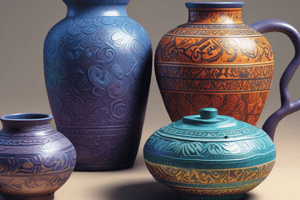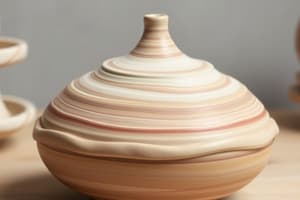Podcast
Questions and Answers
What is the first step in the process of making pottery?
What is the first step in the process of making pottery?
- Shaping the clay
- Firing the pottery
- Removing impurities from the clay (correct)
- Leaving the clay to dry
Which type of pottery is known for its porous texture and is often used for plates and bowls?
Which type of pottery is known for its porous texture and is often used for plates and bowls?
- Porcelain
- Terracotta
- Earthenware (correct)
- Stoneware
At what temperature is stoneware fired compared to earthenware?
At what temperature is stoneware fired compared to earthenware?
- Same temperature
- Lower temperature
- Higher temperature (correct)
- Variable temperature
What gives porcelain its hard, glass-like surface?
What gives porcelain its hard, glass-like surface?
What is the purpose of leaving the clay to dry in pottery making?
What is the purpose of leaving the clay to dry in pottery making?
Which type of pottery is often used for more decorative items and has a smooth, non-porous surface?
Which type of pottery is often used for more decorative items and has a smooth, non-porous surface?
What is the difference between ceramics and pottery?
What is the difference between ceramics and pottery?
What are glazes used for in pottery?
What are glazes used for in pottery?
Which type of glaze is known for its greenish color?
Which type of glaze is known for its greenish color?
What material is fritware glaze made from?
What material is fritware glaze made from?
Which type of glaze is characterized by bright colors and metallic sheen?
Which type of glaze is characterized by bright colors and metallic sheen?
Why is pottery considered a significant part of human history?
Why is pottery considered a significant part of human history?
Flashcards are hidden until you start studying
Study Notes
Pottery is the art and craft of creating items from clay and other materials. It has been used for thousands of years, with evidence of pottery dating back to 29,000 to 25,000 B.C. This ancient art form has played a significant role in human history, influencing culture, commerce, and even religious practices.
The Process of Making Pottery
The process of making pottery involves several steps. First, the clay is prepared by removing impurities and shaping it into the desired form. This can be done by hand or using a potter's wheel. Once the clay is shaped, it is left to dry, a process known as "leaving". After drying, the pottery is fired, which hardens the clay and makes it durable.
Types of Pottery
There are many different types of pottery, each with its own unique characteristics and techniques. Some of the most common types include:
- Earthenware: This type of pottery is made from clay that is fired at a relatively low temperature. It is often used for functional items such as plates and bowls, and is known for its porous texture.
- Stoneware: Stoneware is made from a denser, stronger clay that is fired at a higher temperature than earthenware. It is often used for more decorative items and is known for its smooth, non-porous surface.
- Porcelain: Porcelain is a type of pottery that is made from a fine, white clay. It is fired at very high temperatures, which gives it a hard, glass-like surface. Porcelain is often used for delicate, high-end items such as tea sets and figurines.
- Ceramics: Ceramics is a broader term that includes pottery, but also encompasses other types of clay work such as tiles and sculptures.
Pottery Glazes
Glazes are used to decorate and protect pottery. They are made from a mixture of minerals and other substances, and are applied to the pottery before it is fired. Glazes can be clear, or they can be colored, which can add to the overall appearance of the pottery. Some common types of glazes include:
- Celadon: This type of glaze is known for its greenish color and is often used on earthenware pottery.
- Delft: This type of glaze is characterized by its blue and white design, which is reminiscent of traditional Dutch pottery.
- Fritware: This type of glaze is made from a mixture of glass and clay and is used to create a glass-like surface on pottery.
- Majolica: This type of glaze is characterized by its bright colors and metallic sheen, and is often used on decorative pottery.
Conclusion
Pottery has been a significant part of human history for thousands of years, and continues to be a popular art form today. From functional items like plates and bowls, to decorative pieces like figurines and sculptures, there is something for everyone in the world of pottery. Whether you're a beginner just starting out, or a seasoned artist looking to expand your skills, there's always more to learn and discover in this ancient craft.
Studying That Suits You
Use AI to generate personalized quizzes and flashcards to suit your learning preferences.



